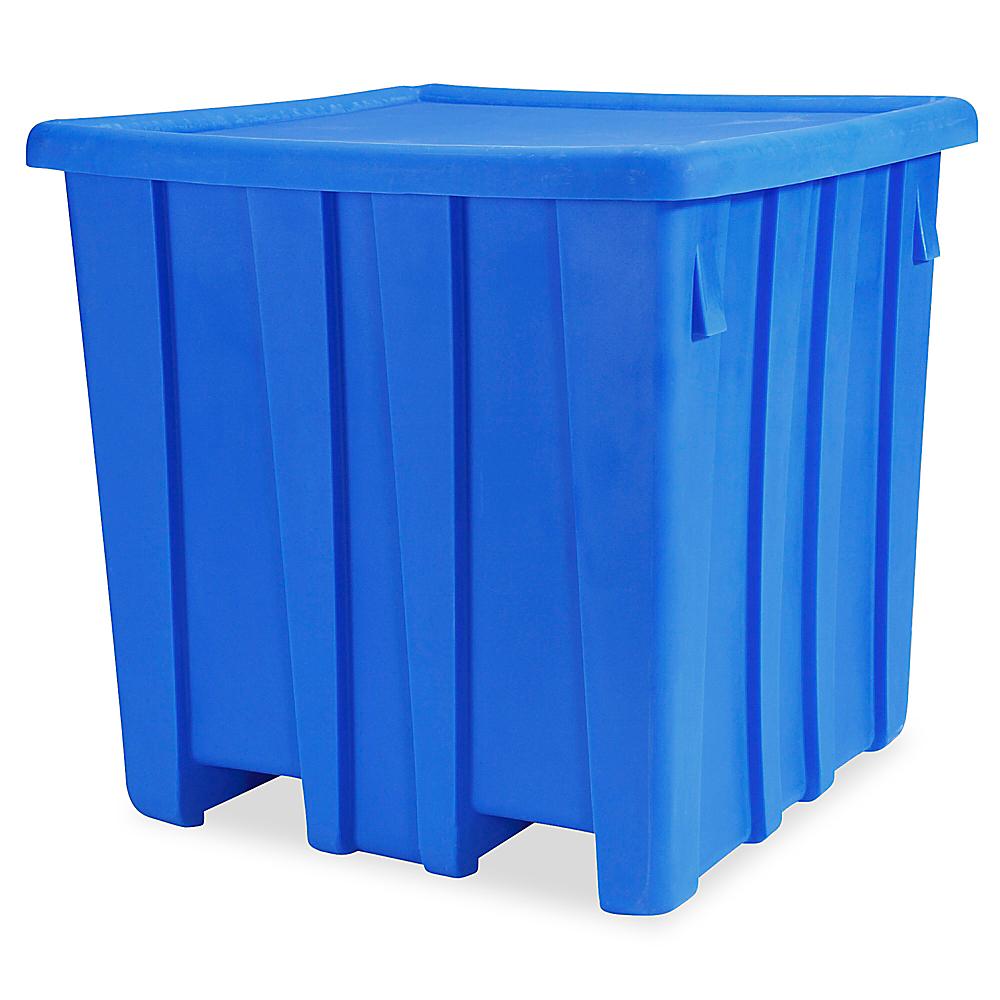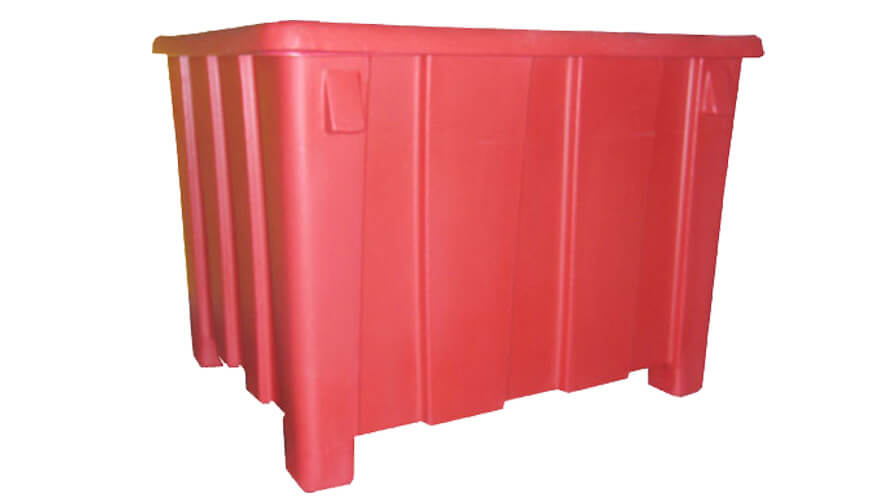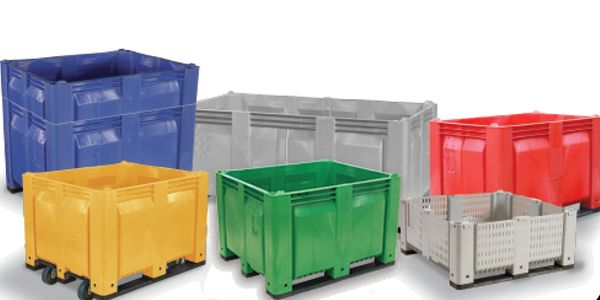The Function of Bulk Plastic Containers in Effective Recycling Practices and Sustainability
Mass plastic containers are integral to modern recycling initiatives. Their style improves the efficiency of material collection and transportation, adding to sustainability objectives. These containers not only maximize space yet additionally assist in keeping an eye on contamination degrees. Their implementation is not without challenges. Comprehending the full extent of their effect reveals a complex relationship between logistics and environmental obligation that calls for more exploration.
Comprehending Bulk Plastic Containers
Bulk plastic containers work as an essential part in various industries, facilitating the storage and transportation of items. These containers are usually made from robust materials such as high-density polyethylene (HDPE) or polypropylene, which offer resilience and resistance to ecological elements. Their design commonly includes features like stackability and modularity, enabling for reliable use area during both storage space and transit.
Industries such as farming, food processing, and producing frequently make use of mass plastic containers because of their light-weight nature and simplicity of handling. The containers are available in various dimensions and configurations, dealing with the certain demands of various items. Their versatility prolongs past plain performance; they can likewise be personalized with lids, manages, and classifying alternatives to enhance usability - Bulk Plastic Containers. Consequently, mass plastic containers play a vital role in enhancing logistics and supply chain operations throughout multiple sectors, consequently adding to general effectiveness and cost-effectiveness
Benefits of Making Use Of Mass Plastic Containers in Recycling
When organizations focus on reusing initiatives, the utilization of bulk plastic containers substantially improves the efficiency of the process. These containers are developed to enhance area, enabling the storage and transportation of larger quantities of recyclable materials. This causes less journeys to recycling centers, thereby decreasing fuel consumption and connected discharges.
In addition, mass plastic containers are immune and durable to numerous ecological aspects, ensuring that materials continue to be shielded throughout handling and transit. Their light-weight design further contributes to lower transport expenses.
Moreover, the harmony of these containers facilitates better sorting and processing of recyclable products, which can improve overall recycling prices - plastic bulk containers. Organizations that adopt bulk plastic containers also show a dedication to sustainability, favorably affecting their brand name image. Inevitably, these advantages not just streamline reusing practices however additionally add to wider ecological objectives
How Mass Plastic Containers Facilitate Product Collection
Effective product collection is greatly improved by the usage of mass plastic containers, as they offer a efficient and structured service for collecting recyclable things. These containers are developed to accommodate huge quantities of materials, which simplifies the sorting and storage procedure. Their stackable design takes full advantage of area utilization, making it easier for facilities to arrange recyclables without clutter.
Furthermore, bulk plastic containers are resilient and weather-resistant, enabling outside placement without deterioration. This resilience guarantees that materials stay safeguarded until they are collected for processing.

The harmony in shapes and size of these containers facilitates standardization throughout collection factors, making it possible for better monitoring of recyclable quantities. Their clear nature allows for easy visibility of contents, assisting in the tracking of contamination levels and guaranteeing that just suitable materials are accumulated. Generally, mass plastic containers play a vital role in improving the material collection process, consequently advertising efficient recycling techniques.
Transportation Efficiency and Environmental Effect
Transport efficiency plays a necessary function in the recycling procedure, especially through the optimization of load capacity wholesale plastic containers. By making the most of the quantity of product transported, firms can substantially reduce the variety of trips required, consequently reducing their carbon footprint. This method not only improves operational effectiveness yet likewise adds to a lot more lasting ecological practices.

Enhancing Tons Capability
Although enhancing load capacity is often ignored, it plays a necessary role in improving transport performance and minimizing ecological impact in recycling practices. By making best use of the quantity that bulk plastic containers can hold, recycling procedures can reduce the number of journeys needed for transportation. This not only reduces gas intake however also lowers the wear and tear on vehicles. Reliable load monitoring allows centers to make use of room effectively, making certain that each transport cycle is as effective as possible. Furthermore, well-optimized loads can lead to better settlements with logistics suppliers, possibly lowering overall prices. Inevitably, enhancing tons ability adds to an extra lasting recycling system by cultivating efficient source usage and minimizing waste created throughout transportation.
Minimizing Carbon Impact
As reusing procedures venture to decrease their environmental effect, decreasing the carbon impact related to transportation arises as a vital objective. Bulk plastic containers play a crucial role in accomplishing this purpose by enhancing load performance and maximizing logistics. Their lightweight yet durable layout permits maximum cargo space utilization, decreasing the number of journeys needed to transfer products. By consolidating deliveries, reusing centers can lower gas intake and greenhouse gas emissions. Furthermore, purposefully situating recycling centers reduces transportation distances, in addition reducing carbon outcomes. Moreover, employing fuel-efficient vehicles and different energy resources enhances overall sustainability. By integrating these methods, the reusing sector can considerably lessen its carbon footprint, adding to a much more sustainable future.
Difficulties in the Use of Bulk Plastic Containers

Contamination Issues
Contamination issues stand for a substantial obstacle in the effective usage of bulk plastic containers within reusing techniques. These containers commonly gather residues from previous contents, leading to combined products that can prevent the reusing process. Pollutants such as food waste, chemicals, or non-recyclable materials can endanger the integrity of the whole batch, causing enhanced disposal expenses and lowered recycling prices. Additionally, improper cleaning or sorting can intensify these issues, making it difficult for recycling centers to process materials successfully. The existence of contaminants not only influences the high quality of recycled products but likewise threatens the total sustainability initiatives intended at lowering plastic waste. Addressing these contamination obstacles is crucial for boosting the efficiency of mass plastic container recycling.
Recycling Infrastructure Limitations
Ineffectiveness in reusing infrastructure presents substantial obstacles for the reliable monitoring of bulk plastic containers. Several reusing facilities lack the capability to refine big quantities of these containers effectively, resulting in enhanced hold-ups and expenses. Furthermore, insufficient sorting modern technologies frequently lead to contamination, as bulk containers may be combined with various other materials, making complex the recycling process. Restricted transportation options also prevent the movement of bulk plastic containers to suitable reusing centers, bring about raised land fill waste. Additionally, an absence of standardized procedures for bulk container reusing creates confusion amongst businesses and consumers, further making complex initiatives to advertise sustainability. Attending to these infrastructure restrictions is necessary to improve reusing methods and take full advantage of the potential of bulk plastic containers in a circular economy.
Best Practices for Carrying Out Bulk Plastic Containers
When companies take into consideration implementing bulk plastic containers in their recycling methods, they should prioritize a calculated method that boosts efficiency and reduces contamination dangers. First, picking the suitable container size and type is vital to accommodate the quantity of materials being refined. Organizations should likewise establish clear labeling and signs to guide users on appropriate disposal methods, reducing confusion and mistakes. Regular training sessions for staff can better strengthen these techniques, ensuring everyone understands their functions in maintaining reusing integrity.
Furthermore, organizations need to execute a routine upkeep schedule to evaluate and clean containers, preventing the accumulation of impurities. Partnering with neighborhood recycling centers can likewise simplify the collection procedure, guaranteeing that materials are successfully refined. Companies need to keep an eye on and review their recycling metrics, using this information to fine-tune methods over time and advertise continual improvement in their sustainability efforts.
The Future of Mass Plastic Containers in Lasting Practices
As companies significantly focus on sustainability, the role of bulk plastic containers in reusing methods is readied to evolve significantly. Advancements in products scientific research are bring about the development of biodegradable and recyclable options, enhancing the ecological benefits of bulk plastic containers. Additionally, the implementation of closed-loop systems will permit for simpler collection and repurposing of these containers, reducing waste and source consumption.
Technical developments, such as wise radar, will allow business to check the lifecycle of bulk containers, enhancing performance in reusing processes. As consumer demand for lasting techniques expands, services will likely embrace bulk plastic containers developed for reuse and long-term worth. Collaboration in between federal governments and industries will cultivate the facility of standard reusing protocols, making sure that bulk containers are properly integrated into more comprehensive sustainability campaigns. Overall, the future of mass plastic containers shows up encouraging, with considerable possibility for adding to a round economy.
Often Asked Concerns
How Are Mass Plastic Containers Made and What Products Are Used?
Mass plastic containers are usually made from high-density polyethylene (HDPE) or polypropylene (PP) These products are refined with shot molding or impact molding methods, causing resilient, light-weight containers appropriate for numerous storage and transportation demands.
Can Bulk Plastic Containers Be Reused Numerous Times Before Recycling?
Yes, bulk plastic containers can be reused several times plastic bulk containers before reusing. Their resilience and layout enable duplicated usage in numerous applications, advertising sustainability and source effectiveness while decreasing the requirement for new containers.

What Qualifications Exist for Bulk Plastic Containers in Recycling?
Various qualifications for mass plastic containers consist of the Recycling Collaboration's qualification, the Cradle to Cradle Certified ™ standard, and the Sustainable Packaging Coalition's standards, making certain containers fulfill particular ecological and recyclability criteria for reliable recycling.
Just How Do Mass Plastic Containers Compare to Various Other Recycling Storage Options?
Mass plastic containers provide better sturdiness and ability contrasted to various other recycling storage alternatives, reducing the danger of contamination and promoting efficient transportation. Their style supports far better company, improving general efficiency in reusing procedures.
What Is the Life expectancy of a Bulk Plastic Container in Recycling Processes?
The life expectancy of a mass plastic container in reusing procedures normally varies from 5 to one decade, relying on use, material high quality, and ecological problems, enabling for numerous cycles of use before ultimate disposal or recycling.
When companies prioritize recycling initiatives, the utilization of mass plastic containers substantially boosts the efficiency of description the process. Transport performance plays an essential function in the recycling process, specifically via the optimization of tons ability in mass plastic containers. The usage of bulk plastic containers in recycling techniques faces significant challenges, specifically worrying contamination problems and limitations within recycling framework. Contamination concerns stand for a substantial difficulty in the reliable use of mass plastic containers within reusing practices. When organizations think about applying mass plastic containers in their recycling practices, they should prioritize a calculated technique that boosts effectiveness and lowers contamination dangers.